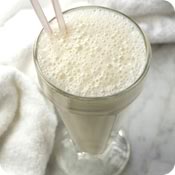 Prostate Cancer
Prostate CancerJapanese men have lower rates of prostate cancer than men in the United States, and some experts contribute that to the Japanese diet, which is high in soy foods. The results of a few animal studies showed promise in this area. However, two small studies on humans (men) yielded controversial results. Soy isoflavones appeared to lower and improve the PSA (prostate-specific antigen) score for some men. For others, PSA level increased, but at a slower rate. And for certain men, the isoflavones worsened the prostate cancer condition. The bottom line: There are not enough human studies to say whether the isoflavones in soy affect prostate cancer for better or for worse. Menopausal Symptoms Does soy relieve hot flashes, night sweats and other menopausal symptoms? Could soy isoflavones be the reason that Japanese women have a lower rate of hot flashes? Current research does not indicate this and study results have been very inconsistent. Roughly 60 percent of trials showed only modest reductions in hot flashes, while the other 40 percent showed no improvements. The bottom line: The claims that soy helps with menopausal symptoms have been blown way out of proportion. The evidence just does not show much benefit. Bone Health It is still too early to conclude whether or not soy helps to build bones. There are currently a few long-term studies investigating the area of soy and bone health. Contrary to popular belief, Japanese women experience as much (if not more) osteoporosis as Caucasian women in the United States. They do suffer fewer bone fractures, but this may be due to genetics or the shape of their bones. The bottom line: Although it will be a few years before the long-term studies conclude, it does look like soy may benefit the bones. Although soy probably does NOT reverse bone loss, it may help prevent bone loss and increase bone density. Brain Power Does soy improve ones cognitive functioning? Very little research has been conducted in this area. But one small, preliminary study on older adults showed that soy isoflavones did improve cognitive functioning. The bottom line: More investigation is needed in this area. Weight Control Although weight management is of great interest to many, very few studies have been conducted in this area. The bottom line: Currently, no studies to indicate that soy protein will enhance weight loss. Infant Formula If you search the Internet for “infant soy formula” you’ll find countless reported concerns that center on hormone-related changes observed in studies where animals consumed a high amount of isoflavones. There appears to be a lot of hype without scientific basis. Currently the world’s largest soy formula-feeding study is being conducted in the United States, releasing information as it becomes available. So far, it appears that healthy babies on soy formula grow as healthy children should grow and have normal brain functioning and development. The bottom line: While we wait for the final results of this study, parents should discuss breastfeeding and formula feeding with their infant’s health care provider. Continued › |


.jpg)



Member Comments